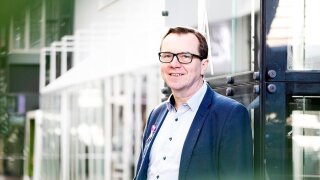Professor Jukka Westermarck has been carrying out research into the biology of cancer for almost 30 years. His research group has endeavoured to identify signalling mechanisms in cancer cells that promote malignancy in cancer. The group’s most significant achievement has been identification of the CIP2A oncoprotein. This has provided new outlooks regarding the future opportunities of cancer treatment.
Westermarck, who carries out internationally significant research and actively advocates for better conditions for doing research, received Orion Research Foundation’s special grant of EUR 100,000 on 27 October.
“I am really pleased about this. In addition to research, the award considers scientific policy lobbying, which I have always felt to be very important.”
For a long time, Westermarck has been furthering the cause of funding for biomedicine and clinical medicine research. “I have also wanted to provoke general discussion on the role of science in Finland. It can certainly be measured by the amount of funding, but universities also need space to do things more freely.”
On the path to being a researcher
Westermarck realised at a young age that he wanted to be a researcher. “My father is a professor in veterinary medicine and when I was young I saw him doing research work. I studied to be a doctor, but worked as a clinician for only one year. From the very beginning, I have wanted to carry out research and take it as far as I can.”
Westermarck started on the path to becoming a researcher when he became the first doctoral student of Adjunct Professor Veli-Matti Kähäri. “I had not actually chosen a subject at that point; it was just important to start doing research. But from the outset I could see that the research question and subject matter of cancer biology that was given to me was very interesting.”
Westermarck defended his doctoral thesis in 1997, after which he spent the period from 1999 to 2001 as a post-doc researcher at the European Molecular Biology Laboratory (EMBL) in Heidelberg. “There, I learned about the recently developed purification method for protein complexes, which was not in use in Finland at that time. I brought the method to Finland and with it we were able to ask new research questions.”
Interaction of genes and proteins
Gene mutations play a major role in the formation of cancers, but genes are only the lowest level over which many other changes occur. “Some of the changes are like an accelerator pedal that speed up the cancer, but there are also things that inhibit the cancer, just like a brake pedal. In order for cancer to form, both of these must be defective. The majority of cancer research focuses on the accelerator pedal side. The research carried out by our group has nearly always focused on the brake pedal, i.e. the natural protein-level of mechanisms that try to prevent the formation of cancer,” says Westermarck.
The research group’s subject of interest has been a certain type of growth inhibitor protein, PP2A, which is a phosphatase that affects protein phosphorylation. “For as long as it works, it can prevent a cell turning into a cancer cell. We have focused on finding out how it is regulated, and how its inactivity affects the behaviour of cancer cells and their drug responses. We and others have shown that the activity of PP2A has an extensive impact on the drug responses of cancer cells. Through this, we have also been able to discover why certain existing cancer medicines lose their efficacy.”
Brake mechanism inhibitor found
About 20 years ago, it was discovered that the inactivity of PP2A makes it possible for cancer to develop. “Then in our own research we found this new protein: CIP2A, which inhibits the PP2A braking mechanism. CIP2A is not genetically altered in cancer, but this protein is overproduced in cancer cells,” says Westermark.
CIP2A overproduction is one of the changes most commonly seen in cancer. “In about 70 per cent of all cancer samples, in almost all cancers, this mechanism is in operation,” says Westermarck.
An important question from the point of view of patients' treatment and medicine is how to affect CIP2A and PP2A medicinally. “We announced the protein structure of CIP2A a few years ago, and the last couple of years we have researched its important structures in terms of the binding of a potential active pharmaceutical ingredient.”
Westermarck feels it is extremely rewarding that, over the last 4–5 years, the biology associated with phosphatases has also received attention in drug development.” We are now starting to get closer to being able to bring the new treatment to patients.”
According to Westermarck, being a successful researcher requires, above all, strong motivation. “At best, there is no better job, but it does also have its downsides. Without true dedication, you may find it difficult to be a researcher. But your diligence and hard work will be rewarded. At different stages of your career, this can mean different things, for example, that you have the energy to pipette, or that you are happy to find out about things and read literature, even though you think you already know a lot. Researchers also need the ability to identify connections and have freedom of thought.”
To keep things balanced, Westermarck has always made sure that there is much more to life than just work. “My family gives me the most strength. Regular fitness training, beautiful music and reading are also very important. The Overstory by Richard Powers recently made a big impression. When you find a good book, it stays with you. Nature is also very important and regarding this, one of the most important places for me is currently the Turku archipelago.”
Jukka Westermarck
- Research Director at the Turku Bioscience Centre and Professor of Cancer Biology at the Department of Medical Biochemistry in the Faculty of Medicine at the University of Turku.
- M.D.Ph.D with an honourable mention from the University of Turku in 1998.








